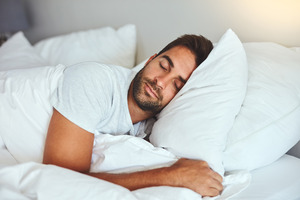
If you’re trying to keep your sleep apnea under control, then it’s important to address any issues that could be affecting the quality of your slumber. One factor that you may be overlooking is the temperature of your bedroom; if it’s too high, it could end up aggravating your sleep apnea symptoms. Here’s a closer look at the connection between sleep apnea and temperature – as well as what you can do to get a better night’s rest.
How Can Temperature Affect Sleep Apnea?
Having sleep apnea means that your breathing is repeatedly stopping and restarting while you’re asleep, typically due to an obstruction of the airway. When your breathing is interrupted, your brain is forced to wake the body up for air. And since sleep apnea episodes can occur many times in a single night, these repeated awakenings will keep disrupting your sleep cycle, leaving you feeling exhausted during the day.
So how can temperature make the problem worse? For one thing, hot weather can often make it harder to breathe, which can easily exacerbate respiratory issues like sleep apnea. Furthermore, your body needs to decrease its core temperature in order to go to sleep. Thus, if your bedroom is too hot, it may be harder to fall and stay asleep – which is not an issue you want to have when sleep apnea is already interrupting your rest.
How Can You Manage Sleep Apnea When It’s Hot?
To make your sleep apnea more manageable, you need to maintain an ideal sleeping environment, and that means controlling the temperature of your bedroom. At night, set your air conditioning for 60 to 67 degrees Fahrenheit. You should also close the curtains in order to keep heat and light out. In some cases, it may be worth investing in a cooling mattress or pillow. And, of course, sometimes a lighter blanket or comforter can make a big difference.
Of course, simply changing your sleeping environment isn’t enough. You also need to make sure that your sleep apnea is being properly treated. Traditionally, this means using a CPAP machine; however, if you find this method to be too noisy or uncomfortable, your dentist may be able to offer oral appliance treatment as an alternative. Oral appliances can help keep your airway open by gently moving your lower jaw forward.
When it comes to sleep apnea, it’s best to be proactive. By improving your sleeping environment and seeking the care you need as promptly as possible, you can get the good night’s rest that you deserve.
About the Author
Dr. Jay A. Nelson received his dental degree from the University of Pennsylvania. He is a diplomate of the American Board of Dental Sleep Medicine, and he has helped treat more than 1,000 patients with sleep breathing disorders. Today, he focuses on providing solutions for snoring, sleep apnea, and associated TMJ problems. To schedule a consultation with Dr. Nelson at Nelson Dental Sleep Medicine in Wesley Chapel, visit his website or call (813) 733-4169.
